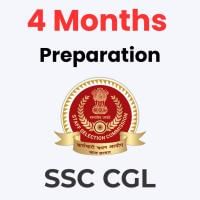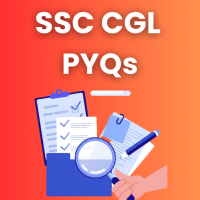SSC CGL Exam > SSC CGL Questions > Identify the sentence with the correct use of...
Start Learning for Free
Identify the sentence with the correct use of the Simple Past tense for a completed action with a result in the present.
- a)She finished her book, and she reads it again.
- b)We finished the race, and we are tired.
- c)They will finish the puzzle, and it is complete.
- d)He finishes the project, and it is successful.
Correct answer is option 'B'. Can you explain this answer?
Verified Answer
Identify the sentence with the correct use of the Simple Past tense fo...
The Simple Past tense can be used to express a completed action in the past with a result in the present. Therefore, "He finishes the project, and it is successful" is the correct sentence. Options A, C, and D use incorrect tenses or structures.
View all questions of this test

|
Explore Courses for SSC CGL exam
|

|
Question Description
Identify the sentence with the correct use of the Simple Past tense for a completed action with a result in the present.a)She finished her book, and she reads it again.b)We finished the race, and we are tired.c)They will finish the puzzle, and it is complete.d)He finishes the project, and it is successful.Correct answer is option 'B'. Can you explain this answer? for SSC CGL 2025 is part of SSC CGL preparation. The Question and answers have been prepared according to the SSC CGL exam syllabus. Information about Identify the sentence with the correct use of the Simple Past tense for a completed action with a result in the present.a)She finished her book, and she reads it again.b)We finished the race, and we are tired.c)They will finish the puzzle, and it is complete.d)He finishes the project, and it is successful.Correct answer is option 'B'. Can you explain this answer? covers all topics & solutions for SSC CGL 2025 Exam. Find important definitions, questions, meanings, examples, exercises and tests below for Identify the sentence with the correct use of the Simple Past tense for a completed action with a result in the present.a)She finished her book, and she reads it again.b)We finished the race, and we are tired.c)They will finish the puzzle, and it is complete.d)He finishes the project, and it is successful.Correct answer is option 'B'. Can you explain this answer?.
Identify the sentence with the correct use of the Simple Past tense for a completed action with a result in the present.a)She finished her book, and she reads it again.b)We finished the race, and we are tired.c)They will finish the puzzle, and it is complete.d)He finishes the project, and it is successful.Correct answer is option 'B'. Can you explain this answer? for SSC CGL 2025 is part of SSC CGL preparation. The Question and answers have been prepared according to the SSC CGL exam syllabus. Information about Identify the sentence with the correct use of the Simple Past tense for a completed action with a result in the present.a)She finished her book, and she reads it again.b)We finished the race, and we are tired.c)They will finish the puzzle, and it is complete.d)He finishes the project, and it is successful.Correct answer is option 'B'. Can you explain this answer? covers all topics & solutions for SSC CGL 2025 Exam. Find important definitions, questions, meanings, examples, exercises and tests below for Identify the sentence with the correct use of the Simple Past tense for a completed action with a result in the present.a)She finished her book, and she reads it again.b)We finished the race, and we are tired.c)They will finish the puzzle, and it is complete.d)He finishes the project, and it is successful.Correct answer is option 'B'. Can you explain this answer?.
Solutions for Identify the sentence with the correct use of the Simple Past tense for a completed action with a result in the present.a)She finished her book, and she reads it again.b)We finished the race, and we are tired.c)They will finish the puzzle, and it is complete.d)He finishes the project, and it is successful.Correct answer is option 'B'. Can you explain this answer? in English & in Hindi are available as part of our courses for SSC CGL.
Download more important topics, notes, lectures and mock test series for SSC CGL Exam by signing up for free.
Here you can find the meaning of Identify the sentence with the correct use of the Simple Past tense for a completed action with a result in the present.a)She finished her book, and she reads it again.b)We finished the race, and we are tired.c)They will finish the puzzle, and it is complete.d)He finishes the project, and it is successful.Correct answer is option 'B'. Can you explain this answer? defined & explained in the simplest way possible. Besides giving the explanation of
Identify the sentence with the correct use of the Simple Past tense for a completed action with a result in the present.a)She finished her book, and she reads it again.b)We finished the race, and we are tired.c)They will finish the puzzle, and it is complete.d)He finishes the project, and it is successful.Correct answer is option 'B'. Can you explain this answer?, a detailed solution for Identify the sentence with the correct use of the Simple Past tense for a completed action with a result in the present.a)She finished her book, and she reads it again.b)We finished the race, and we are tired.c)They will finish the puzzle, and it is complete.d)He finishes the project, and it is successful.Correct answer is option 'B'. Can you explain this answer? has been provided alongside types of Identify the sentence with the correct use of the Simple Past tense for a completed action with a result in the present.a)She finished her book, and she reads it again.b)We finished the race, and we are tired.c)They will finish the puzzle, and it is complete.d)He finishes the project, and it is successful.Correct answer is option 'B'. Can you explain this answer? theory, EduRev gives you an
ample number of questions to practice Identify the sentence with the correct use of the Simple Past tense for a completed action with a result in the present.a)She finished her book, and she reads it again.b)We finished the race, and we are tired.c)They will finish the puzzle, and it is complete.d)He finishes the project, and it is successful.Correct answer is option 'B'. Can you explain this answer? tests, examples and also practice SSC CGL tests.

|
Explore Courses for SSC CGL exam
|

|
Signup for Free!
Signup to see your scores go up within 7 days! Learn & Practice with 1000+ FREE Notes, Videos & Tests.


















